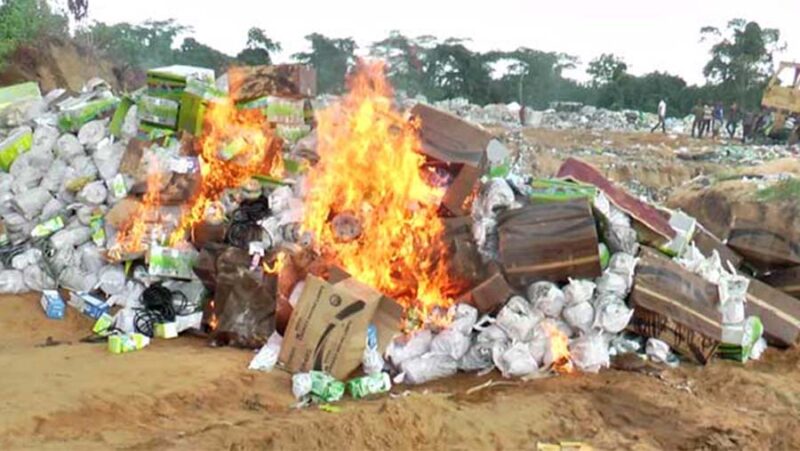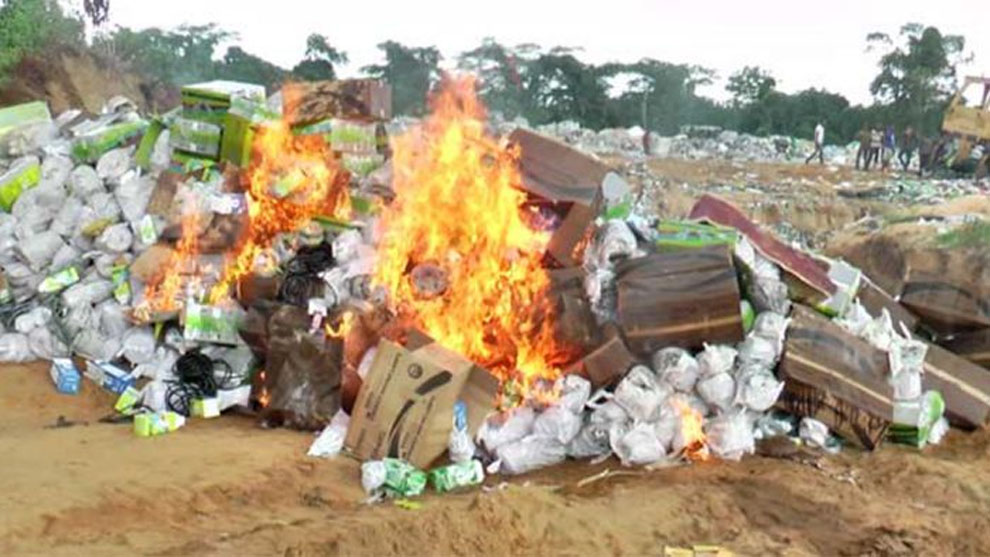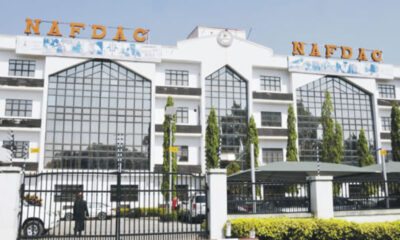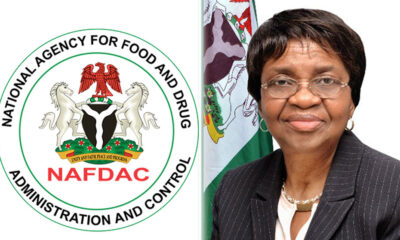Health
NAFDAC destroys fake, expired drugs, food worth N500 million

NAFDAC destroys fake, expired drugs, food worth N500 million
The National Agency for Food and Drug Administration and Control (NAFDAC) on Wednesday destroyed fake and expired goods worth over N500 million in Abuja.
Speaking during the exercise, the Director-General (DG) of the agency, Mojisola Adeyeye, stated that some of the goods were also voluntarily submitted to the agency.
Represented by Francis Ononiwu, NAFDAC director of Investigation and Enforcement, the DG stated that the exercise is carried out routinely all over the country.
The NAFDAC boss said that the destruction of the products was done to prevent their re-introduction to the supply chain.
Mrs Adeyeye listed some of the products destroyed as drugs made up of psychoactive and controlled substances like antibiotics, antihypertensive, antimalarials, herbal snuff and herbal remedies, and drugs confiscated from drug hawkers.
She also listed the food products such as Spaghetti, vegetable oil, and non-alcoholic beverages, including a 1 by 40ft container of unregistered Faurecia instant-powered milk that was handed over to the agency by the Nigeria Customs Services (NCS).
Others were cosmetics such as creams, lotion, and pomade, including skin-lightening creams seized from SPAS and beauty centres, chemicals such as fake insecticides and medical devices.
Also destroyed were expired and unwholesome products voluntarily handed over for destruction by compliant companies, Non-Governmental Organisations (NGOs) and the Association of Community Pharmacy of Nigeria (ACPN).
READ ALSO:
- Three terrorists, one soldier killed in Kaduna gun battle
- Confidential files: Tinubu allegedly blocks FBI, CIA, US agencies
- China okays funding of Abuja-Kano, PH-Maiduguri railway projects
According to the NAFDAC boss, the estimated street value of the products being destroyed is N535 million.
“I have said it on several platforms that drug counterfeiting is an act of economic sabotage, and it also represents a serious threat to public health, and NAFDAC under my watch has been repositioned to fight this menace.
”The agency has adapted proactive approach by engaging political, traditional, faith leaders, journalists and other Nigerians to sensitise their wards on the dangers of dealing with substandard and falsified medicine.
“I wish to use this medium to urge all and sundry to be on the lookout for spurious and counterfeit medicines, unwholesome foods and other regulated products and report same to NAFDAC,” she said.
NAFDAC and security officials during the destruction Isiaku Gamajira, FCT Coordinator, Standard Organisation of Nigeria (SON), stated that NAFDAC is a sister agency when it comes to the regulation of products, hence the reason why SON was at the event.
He noted that many people lack education on how to get certification for their products, stressing that it is the reason why most goods from Nigeria are rejected abroad.
“We are aware of government policy on zero rejection of Nigeria products, we have a policy called product certification in which a certificate is issued on products made in Nigeria that are to be exported.
READ ALSO:
- NSCDC seals 3 security firms for illegal operations
- Protests hit Middle East over Gaza hospital explosion
- Why we asked students to resume with mattresses – UNILAG
“In doing all these, we ensure that we key into the principle set up in line with the government of the exporting country, and issue a certificate of performance to avoid Nigeria’s product rejection when they get to the point of entry.
“We have offices all over the country where information about product certification can be gotten, our addresses are also available online for you to reach out to us.
“We provide people with proper guidance when they approach us, SON has been carrying out its compliance activities among which is the seizure of substandard products. We have just destroyed tyres.
“Tyre is a product which lives depend on and SON has a serious interest when it comes to compliance action, seizure in that regard, on September 29, SON destroyed a lot of tyres and these are some of the things we do.
“Most of these tyres are imported, it is our own commonwealth, If you see the quantum of what we have destroyed in the last few months, you will be surprised,” Gamajira said.
Enejoh Amade, chairman of the Association of Community Pharmacists of Nigeria (ACPN), FCT Chapter, said his association would continue to support NAFDAC to rid the country of substandard drugs.
He said that his association had partnered with NAFDAC on the exercise by bringing some expired drugs collected from members of ACPN.
NAFDAC destroys fake, expired drugs, food worth N500 million
Health
Drug prices may drop as FG implements zero VAT, duties

Drug prices may drop as FG implements zero VAT, duties
Experts say prices of drugs are likely to drop following the implementation of the federal government’s executive order on zero VAT and excise duties on pharmaceutical products and medical devices.
The Nigeria Customs Service yesterday said it had commenced the implementation of Value Added Tax (VAT) and import duty exemption on raw materials essential for the production of pharmaceutical products.
The National Public Relations Officer of the Nigerian Customs Service (NCS), Assistant Comptroller of Customs, Abdullahi Maiwada, in a statement on Wednesday, said the decision was in line with the presidential order to boost local production of healthcare products
President Bola Tinubu had, in June last year, signed the Executive Order to increase local production of pharmaceutical, diagnostics and medical devices.
The NCS’ spokesman said: “Critical raw materials essential for the production of pharmaceutical products will be exempted from import duty and Value Added Tax (VAT) for a period of two years.”
The statement added that the exemption covers Active Pharmaceutical Ingredients (APIs), excipients and other vital raw materials required for manufacturing essential medicines, Long-Lasting Insecticidal Nets (LLINs), Rapid Diagnostic Kits, reagents and packaging materials.
READ ALSO:
- Ex-Kano emir Bayero cancels Sallah durbar amid tension
- Poland suspends migrants’ right to apply for asylum
- Trump slaps 25% tariffs on car imports to US
- Reps pass bill to strip Vice President, governors, deputies of immunity
Maiwada said to ensure that these fiscal incentives are fully utilised, eligibility is limited to manufacturers of pharmaceutical products recognised by the Federal Ministry of Health and Social Welfare, provided they possess a valid Tax Identification Number (TIN).
Experts speak
Experts said the implementation of the Executive Order would address the skyrocketing cost of medicines.
A former National Secretary of the Pharmaceutical Society of Nigeria (PSN), Pharm. Iyiola Gbolagade, in a chat with our correspondent, described the implementation of the Executive Order as commendable, saying it would lead to reduction of prices some locally manufactured medicines like antibiotics and antimalarial drugs.
A former chairman of the Association of Community Pharmacists of Nigeria (ACPN) FCT chapter, Pharmacist Eneojo Made, said the implementation of Zero VAT and exercise duties on Active Pharmaceutical Ingredients (APIs), which are used to produce medicines, would boost the production of essential medicines for various categories of diseases thereby enhancing availability and access to them in the country.
A former National Publicity Secretary of the Association of Community Pharmacists of Nigeria (ACPN), Kenneth Edeh Ujah, said, “When the cost of production of medicines at various stages is lower, of course, it is going to have that direct impact on the eventual cost of the medicine when people visit the pharmacy to buy their drugs.”
Also, Prof Cyril Odianose Usifoh, the immediate past president, Pharmaceutical Society of Nigeria (PSN), said the potential for success in the order was boosted because specified items include Active Pharmaceutical Ingredients (APIs), excipients, essential raw materials required for manufacturing of crucial products, including drugs, long lasting insecticidal bed nets, rapid diagnostic kits and others.
The Federal Ministry of Health and Social Welfare had, in a statement, said the Executive Order is a significant milestone, as it opens the door for local pharmaceutical and medical device manufacturers to begin fully benefiting from the relief measures outlined by President Bola Ahmed Tinubu in the Executive Order
Drug prices may drop as FG implements zero VAT, duties
Health
Nigerian doctor pioneers W’Africa first robotic prostate cancer surgery

Nigerian doctor pioneers W’Africa first robotic prostate cancer surgery
A Nigerian Consultant Urological/Robotic Surgeon, Professor Kingsley Ekwueme on Monday in Lagos pioneered the first West African robotic surgery on a prostrate cancer patient.
Ekwueme, a UK-based medical doctor returnee recently established The Prostate Clinic, (TPC) Nigeria Centre for Robotic and Laparoscopic Surgery, the first super-specialised clinic in West Africa dedicated to the diagnosis and treatment of prostate cancer, utilising cutting-edge robotic surgery.
“This is truly historic,” declared Ekwueme, the clinic’s founder.
“We are bringing technology that has never been seen before in this region, giving Nigerians access to world-class treatment right here at home.”
The clinic’s centerpiece is the Da Vinci Robot, an advanced surgical system that provides unparalleled precision and minimally invasive procedures. “
Briefing journalists on the feat, Ekwueme explained that: “The Da Vinci Robot offers three-dimensional imaging and seven degrees of freedom, allowing for surgeries with minimal blood loss and faster recovery times.”
“Patients experience significantly less pain and scarring compared to traditional open surgeries.”
Ekwueme, a renowned urologist, emphasised that the technology extends beyond prostate cancer.
“We are treating a range of urological conditions in both men and women, including kidney cancer, bladder cancer, kidney stones, and benign prostatic hyperplasia. Our goal is to transform surgery in Nigeria.”
READ ALSO:
- How 12 inmates escape in Kogi jailbreak – Prison spokesman
- Fubara: Supreme Court reacts to photo of Justice Agim with Wike
- Aviation workers threaten nationwide airports shutdown over Customs officer assault
Noting that the key focus of the clinic was accessibility, he said he is determined to make these advanced procedures affordable for all Nigerians.
“My mission is to ensure that no one in this country dies needlessly due to a lack of access to quality care.
“We are working to make these procedures as cost-effective as possible, and we are open to partnerships with the government to expand our reach.”
To address Nigeria’s power challenges, the clinic is equipped with a comprehensive solar power system, ensuring uninterrupted operations. “We understand the importance of reliable power.
“Our 24-hour solar system ensures that we can provide consistent, high-quality care.”
He said he is also committed to training local medical professionals in robotic surgery, ensuring the long-term sustainability of the technology in Nigeria.
“We are investing in the future of Nigerian healthcare. We want to empower our doctors with the skills they need to provide world-class care.”
Debunking common misconceptions about prostate and sexual activities, Ekwueme clarified that there is no proven dietary prevention for prostate cancer. “The primary risk factors are age, race, and family history. Early detection and access to advanced treatment are crucial.”
Looking ahead, Ekwueme revealed plans to introduce groundbreaking technology for benign prostatic hyperplasia (BPH) with zero blood loss.
“I am doing a procedure tomorrow, and soon I will unveil a technology that has never been done in Africa, splitting the prostate from the inside with absolutely no blood loss,” he stated.
He said with its state-of-the-art technology, commitment to affordability, and focus on local training, The Prostate Clinic Nigeria Centre for Robotic and Laparoscopic Surgery is poised to revolutionise cancer care in West Africa, offering hope and advanced treatment options to countless Nigerians.
Nigerian doctor pioneers W’Africa first robotic prostate cancer surgery
Health
FG destroys another 200 containers of expired drugs

FG destroys another 200 containers of expired drugs
The Federal Government Joint Committee on the destruction of fake, illicit and expired pharmaceuticals has destroyed another 200 containers of substandard drugs worth billions of Naira imported into the country through the Apapa and Tin-Can Island seaports.
This is coming after the committee initially destroyed 250 containers of the same expired pharmaceutical products in January, 2025.
To this end, the committee comprising the Nigerian Customs Service (NCS), National Security Adviser (NSA), National Drug Law Enforcement Agency (NDLEA), National Agency for Food Drugs Administration and Control (NAFDAC) and Nigerian Army has destroyed a total of 450 containers of expired drugs in the first quarter of 2025.
The destruction exercise which took place in Epe, Lagos State yesterday, was part of a broader initiative of the Federal Government to curb importation of illicit and controlled drugs in order to safeguard public health and curb drug-related crimes in the country.
The pharmaceuticals destroyed were Tramadol, codeine, Apetamine, and Analgin injection amongst others.
Speaking to newsmen, the National Security Adviser (NSA), Mallam Nuhu Ribadu, said the initiative was important to prevent the circulation of dangerous substances such as Tramadol and Codeine, which are often abused, thus contributing to criminal activities in the country.
READ ALSO:
- Rivers court bars woman from answering ex-husband’s name
- PDP gives condition to back Atiku, Obi, El-Rufai in 2027
- Gov Fubara’s suspension dents Nigeria’s image, says ex-President Jonathan
Mallam Ribadu, who was represented by Ibrahim Sulaiman, said the destroyed drugs were seized at Apapa, Tin Can, and Lekki seaports.
He, however, disclosed that similar destruction was conducted in Port Harcourt as part of the first phase.
“The National Security Adviser is very passionate about ensuring that these illicit drugs do not remain in circulation. The government will not allow perpetrators to act with impunity; they will be arrested and prosecuted,” he stated.
The intercepted drugs were either expired or classified as controlled substances that should only be used under strict medical supervision.
Also, the Assistant Customs Controller, A.O Oguntuase from FOU Zone A, emphasised the enforcement efforts of security agencies in tracking and intercepting these illegal imports.
“Through intelligence gathering and swift action, we have been able to prevent the distribution of these drugs.
“The value of the destroyed substances is enormous, with each container estimated to be worth close to a billion naira,” he said.
On his part, representative of the NDLEA, DC Omotosho Solomon, stated that suspects arrested in connection with the goods were being tried in court.
Solomon warned importers engaged in the trafficking of illicit drugs and pharmaceuticals to desist from such acts or face the full process of law on illegal importation.
FG destroys another 200 containers of expired drugs
-

 Uncategorized1 day ago
Uncategorized1 day agoBreaking: Moon sighted in Saudi, UAE, others, Eid-Fitr holds Sunday
-

 metro3 days ago
metro3 days agoEFCC re-arraigns son of ex-PDP chairman for alleged N2.2bn oil subsidy fraud
-

 metro1 day ago
metro1 day agoRamadan ends in Nigeria, Sultan announces March 30 as Eid-el-Fitr
-

 metro2 days ago
metro2 days agoFubara reacts as Ex-HOS, Nwaeke accuses him of bombing oil pipelines, Rivers Assembly
-

 metro3 days ago
metro3 days agoWe welcome Gov Makinde’s U-turn on Shari’ah panel – MURIC
-

 Opinion2 days ago
Opinion2 days agoBarbaric mass burning of innocents in Edo, by Farooq Kperogi
-

 Uncategorized3 days ago
Uncategorized3 days agoObasanjo’s position on Rivers emergency rule hypocritical, says Presidency
-

 metro2 days ago
metro2 days agoEx-Rivers HoS wife cries for help over husband’s safety







